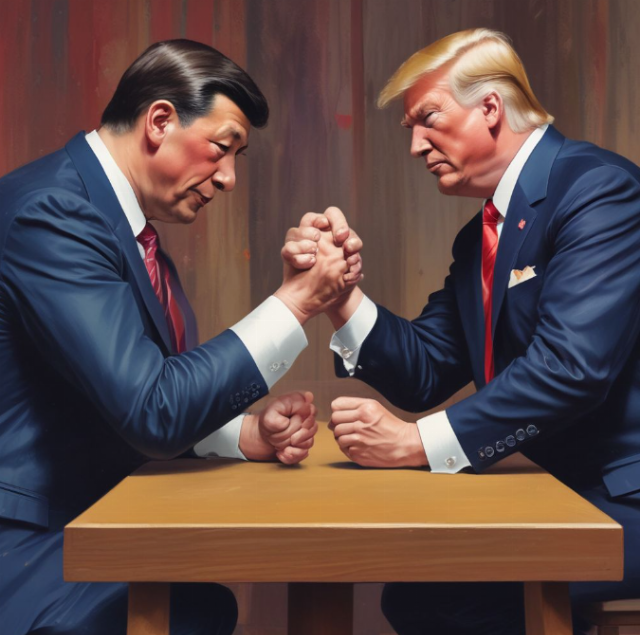Show of strength: Trump concludes Asia trip
President Donald Trump has concluded his week-long trip to Asia. Air Force One returned carrying another peace treaty, trade deals, and a one-year ceasefire with China on rare earths.
The contrast could hardly be sharper. On one side: yet another EU summit -- hard to keep track -- with its 19th sanctions package against Russia. Promises fly: deregulation, climate protection, competitiveness -- followed by the usual slow, fruitless negotiations. Europeans increasingly resemble a therapy group, meeting regularly to validate one another’s actions, yet this path leads straight into economic and geopolitical irrelevance.
Trump’s China Policy
On the other side: Donald Trump, ending his Asia trip Thursday with a deal struck with Chinese President Xi Jinping in Busan, South Korea.
The two-hour summit was their first meeting since 2019 and marks a temporary peak in the U.S.-China struggle over the global economic order.
Trump rated the meeting a “12 out of 10,” claiming the dispute with China was settled. Taiwan was not discussed.
The agreement includes: China will refrain from imposing an export ban on rare earths for at least one year, increase purchases of U.S. agricultural products -- especially soybeans -- and begin importing U.S. gas and oil from Alaska. In return, the U.S. will reduce tariffs on Chinese goods from 57% to 47%.
A sensitive point: Trump demanded an end to Chinese fentanyl exports -- a diplomatic hot potato. It is well documented that the Chinese state has facilitated exports that, once routed through South America by cartels, serve as a geopolitical weapon against the U.S. -- a modern opium war.
Tariffs Remain the Ultimate Lever
In the complex U.S.-China power play, Trump’s tariff leverage has proven most effective. It hits the Achilles heel of Chinese economic policy: every tariff increase cuts directly into the margins of the export machine, responsible for roughly 1% of global GDP. This export economy also serves as an internal safety valve, stabilizing the job market after crises such as the real estate collapse.
Trump’s calculation is simple but effective: every small economic weakness increases domestic pressure on Xi and the party elite. The result speaks for itself: the U.S. holds the stronger hand in this power poker.
Regarding the rare earths moratorium, Europeans -- and particularly German policymakers and industry -- should thank Trump. He has temporarily lifted a problem they could no longer address on their own. Brussels and Berlin now have time to act strategically with Washington, ensuring rare earth supplies and possibly reshaping trade with China. It is high time to drop the senseless attack on U.S. tech firms and consolidate geopolitically.
Networks and U.S. Presence
Trump’s Asia trip began with the “Kuala Lumpur Peace Accords,” a treaty between Thailand and Cambodia involving arms withdrawal and mine clearance at the border.
At the ASEAN summit, Trump emphasized U.S. mediation in the peace process and demonstrated American presence in Asia.
He signed deals with Malaysia and Thailand to diversify supply chains for critical minerals and rare earths. Australia committed to new mining projects, and Japan agreed on rare earth production, processing, and supply with the U.S. The effort builds a resilient, diversified network to reduce dependence on China.
Chipping Away at China’s Dominance
A bold move: Trump authorized South Korea to build nuclear-powered submarines ahead of the Xi summit, to be constructed at Philadelphia Shipyard, where South Korean companies have already invested heavily.
Under Beijing’s watchful eye, the U.S. strengthens its alliance with Seoul and sends a clear signal to North Korea. This multi-billion-dollar project also fits into U.S. reindustrialization. Trump merges geopolitical interests with hard economic calculations, showing the same skill he displayed during his Middle East trip, which attracted hundreds of billions in U.S. investment.
EU Increasingly Isolated
Trump can count his Asia trip as a foreign policy triumph. The U.S. emerges as the clear winner in this round of global power play, with the domestic economy benefiting from substantial capital inflows.
A note on the EU: just weeks ago, Brussels announced a complete phase-out of Russian energy imports starting next year. Japan’s new prime minister, Sanae Takaichi, meanwhile, confirmed continued LNG imports from Russia’s nearby Sakhalin-2 project. The U.S. has not objected. Recognition of American dominance in geopolitics pays off for partners that pursue rational foreign policy and acknowledge U.S. supremacy.

Image: AT via Magic Studio